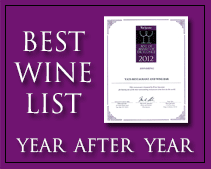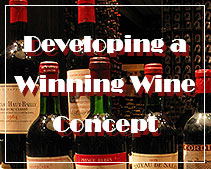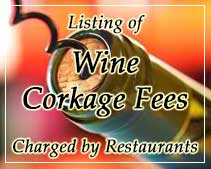The Many Levels of Burgundy
September 13, 2010
Philippines Wine Shop Clark Wine Center is pleased to share with you articles, news and information about wine, wine events, wine tasting and other topics related to wine and the appreciation of wine.
The Louis Jadot label shows that the winemaker is Louis Jadot, a negociant based in Beaune. The wine comes from the Chambolle-Musigny village, from the Les Charmes vineyard, which is a Premier Cru vineyard. What does all this mean?
The vineyards of Burgundy are ranked. The very best vineyard sites are labelled “Grand Cru.” Other vineyard sites of exceptional (but not Grand Cru) quality are labeled “Premier Cru.”
A Burgundy wine label will always list the most specific geographic location that the grapes originate from, and typically nothing else. Here’s how to read the following labelling situations:
Anywhere in Burgundy
A wine originating anywhere in Burgundy will indicate “Appellation Bourgogne Controlee.”
Subregion of Burgundy
A wine originating from a more specific region, such as the Cote Chalonnaise, will indicate so via the AOC statement.
Specific Village
A wine originating from a specific village will indicate so via the AOC statement. The surrounding region is not named; thus, a label indicating Appellation Santenay Controlee comes from the Santenay village in Cote de Beaune.
Specific Vineyard
In many cases, if a specific vineyard is named, it is a Premier Cru vineyard. The AOC statement will indicate the village. For example, a wine from the “La Comme” vineyard in Santenay (which is a Premier Cru vineyard) will display “Santenay” in large type, “La Comme” underneath in smaller type, and indicate Appellation Santenay Premier Cru Controlee. A Premier Cru wine will always indicate so in the AOC statement.
Premier Cru
In some cases a wine may be AOC Premier Cru but not from a specific vineyard. In these cases, the wine is a blend from various different Premier Cru vineyards. The smallest enclosing region is indicated on the label.
Grand Cru Vineyard
A wine from a Grand Cru vineyard will indicate the vineyard name on the label and little else. Thus, wine from the Grand Cru Musigny vineyard will indicate “Musigny” on the label, and the serious wine drinker is expected to know that the Musigny Grand Cru vineyard is in the village of Chambolle-Musigny in the Cote de Nuits. The AOC statement may state as little as “Appellation Controlee” (this is because the implied AOC region is the named vineyard).
It is worth knowing the names of some of the more famous Grand Cru vineyard sites so that you will recognize them: Clos de Vougeot, Musigny, Chambertin, Clos de la Roche, Romanee-Conti, and Montrachet (white). Romanee-Conti is very small and is one of the most sought after and expensive red wines in the world.
What’s Grown
Red Burgundy is made exclusively of the Pinot Noir grape. This is a tempermental and difficult grape to grow, and quality from vintage to vintage in Burgundy can vary widely depending on weather. In a good year, the wine is fabulous; in a bad year, it is barely drinkable. Vintage charts can be found in most major wine publications, but this is of interest only if you intend to delve deeply into Burgundy wines.
White Burgundy is made exclusively of Chardonnay. In Burgundy at large (AOC Bourgogne), it may be made with or without oak. In Chablis, oak is almost never used. For one accustomed to the heavy oak influence common in most American Chardonnay, a good Chablis is an interesting change of pace.
It’s the Terroir
In Burgundy, they believe that it is the land (what the French call terroir) that really makes the wine, that every village and district has its own distinctive climate and soil, and that the grape and the wine are an expression of the land.
Sometimes, this means that the wine tastes like dirt. Literally. Many Burgundies have a distinctively earthy flavor that many people find not entirely pleasant. This dirt seems to taste different from one region to another, so maybe there’s something in this whole terroir business after all. Unfortunately, this means that quality within Burgundy can vary greatly and unpredictably. The only thing that doesn’t vary greatly is price, which is universally on the expensive side.
The Regions of Burgundy
From north to south, the major sub-regions and villages are:
- Chablis – white Chardonnay only
- Cote de Nuits – bordered on the north by Dijon
- Dijon
- Gevrey-Chambertin
- Morey-St-Denis
- Chambolle-Musigny
- Vosne-Romanee
- Vougeot
- Nuits St George
- Cote de Beaune – centered around the city of Beaune
- Corton
- Savigny
- Beaune
- Pommard
- Volnay
- Meursault
- Puligny-Montrachet
- St-Aubin
- Chassagne-Montrachet
- Santenay
- Cote Chalonnaise – Burgundy’s bargain basement
- Mercurey
- Maconnais – centered around the city of Macon
- Pouilly-Fuisse
The Cote d’Or refers collectively to Cote de Nuits and Cote de Beaune
The Cote de Nuits is considered the “best” region, but good wine is available from all across Burgundy.
The Middleman
Many, if not most, of the vineyards in Burgundy have multiple owners. That is, one family might own half the vineyard, another family another third, and yet another family the third and fourth westernmost rows of vines. Thus, it is quite common to see wines from different producers from the same vineyard.
Since most vineyard “owners” own too little land to support a full winemaking and bottling operation (what can you do with two rows, even if they are Grand Cru?), wine merchants or negociants purchase grapes from the small growers and make and bottle the wine under their own names. Much of the wine from Burgundy is sold under the labels of various negociants. Several well-known and easily available ones are Louis Jadot, Joseph Drouhin, Louis Latour, and Bouchard.
A negociant-bottled wine will say that it is bottled for the negociant; so a Louis Jadot wine will say “mis en bouteille par Louis Jadot.” A wine that is not bottled by a negociant but made by the grower will say “mis en bouteille au domaine,” “mis en bouteille a la propriete,” or “mis au domaine.”
What’s Good
Entire books have been written on this subject. There are far too many tiny producers in Burgundy to make naming specific wines very useful; you’re not likely to find them in a typical wine shop.
Examine the label. Look out for wines from the better regions, or from well-ranked vineyards. While this is not a guarantee of quality, your chances will be significantly better. Wine that is simply labelled as “AOC Bourgogne” is generally not very interesting and not worth pursuing.
There are several major negociants that have solid reputations and are easily available anywhere in the United States. I have had good experiences with Louis Jadot, one of Burgundy’s largest negociants. Their line runs the full range of Burgundy, covering all the major regions and subregions, as well as many of the famous Grand Cru and Premier Cru vineyards. A sampling of the Louis Jadot line gives a broad picture of the entire Burgundy region, and will keep you occupied for a while.
Typically, the Cote de Beaune wines are lighter than Cote de Nuits. If you aren’t fond of the extreme earthiness characteristic of the heavier burgundies, you should look here. Also, they tend to be more affordable as well.
I should remark that while Chablis by itself isn’t very impressive (there’s a reason the rest of the world uses oak for Chardonnay), it pairs fabulously with food. The characteristics that make it less interesting by itself match extremely well with rich, heavy, buttery food. Look for it on restaurant wine lists!
Source: http://userweb.cs.utexas.edu/~walter/wine/burgundy.html
Clark Wine Center was built in 2003 by Hong Kong-based Yats International Leisure Philippines to become the largest wine shop in Philippines supplying Asia’s wine lovers with fine vintage wines at attractive prices. Today, this wine shop in Clark Philippines offers over 2000 selections of fine wines from all major wine regions in the world. As a leading wine supplier in Philippines, Pampanga’s Clark Wine Center offers an incomparable breadth of vintages, wines from back vintages spanning over 50 years. Clark Wine Center is located in Pampanga Clark Freeport Zone adjacent to Angeles City, just 25 minutes from Subic and 45 minutes from Manila.
Wines from Burgundy, Bordeaux, Rhone, Loire, Spain, Portugal, Germany, Austria, Alsace, USA, Australia, New Zealand, Italy, South Africa, Chile and Argentina etc. are well represented in this Clark Wine Shop.
For more information, email Wine@Yats-International.com or visit http://www.ClarkWineCenter.com
You can skip to the end and leave a response. Pinging is currently not allowed.







